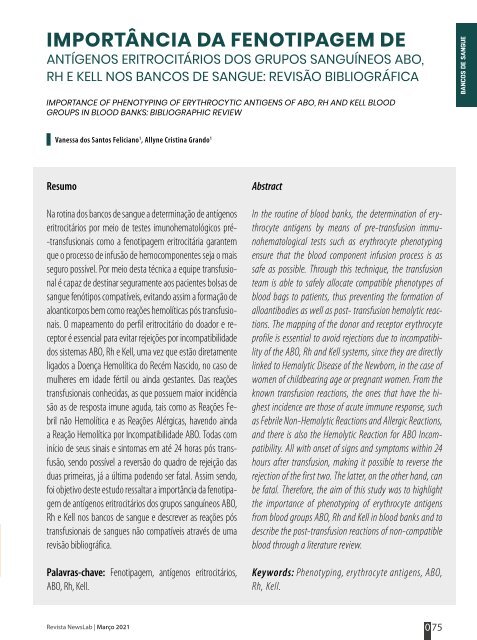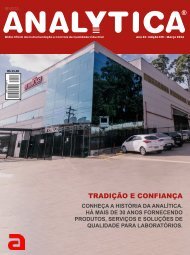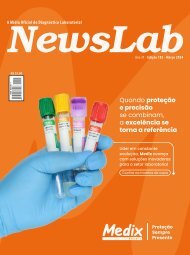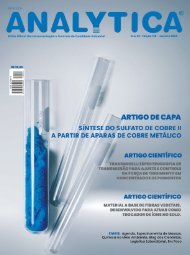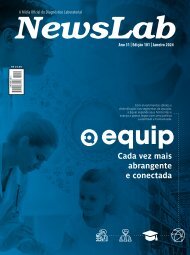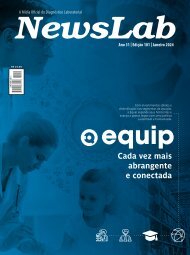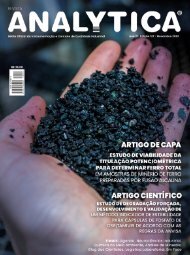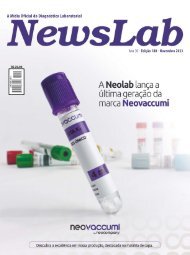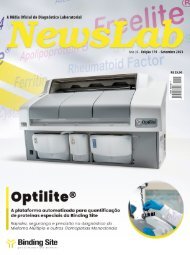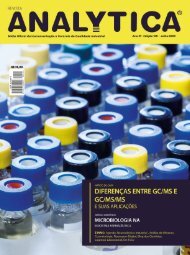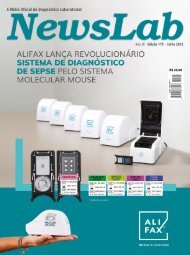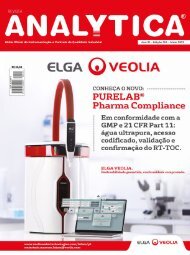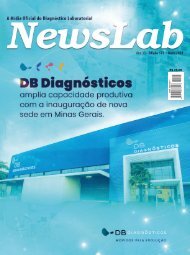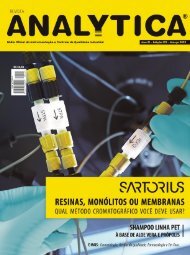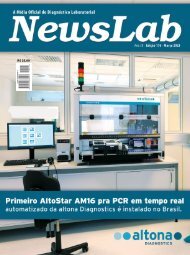Revista Newslab Edição 164
Revista Newslab Edição 164 - Março 2021
Revista Newslab Edição 164 - Março 2021
You also want an ePaper? Increase the reach of your titles
YUMPU automatically turns print PDFs into web optimized ePapers that Google loves.
IMPORTÂNCIA DA FENOTIPAGEM DE<br />
ANTÍGENOS ERITROCITÁRIOS DOS GRUPOS SANGUÍNEOS ABO,<br />
RH E KELL NOS BANCOS DE SANGUE: REVISÃO BIBLIOGRÁFICA<br />
BANCOS DE SANGUE<br />
IMPORTANCE OF PHENOTYPING OF ERYTHROCYTIC ANTIGENS OF ABO, RH AND KELL BLOOD<br />
GROUPS IN BLOOD BANKS: BIBLIOGRAPHIC REVIEW<br />
Vanessa dos Santos Feliciano 1 , Allyne Cristina Grando 1<br />
Resumo<br />
Na rotina dos bancos de sangue a determinação de antígenos<br />
eritrocitários por meio de testes imunohematológicos pré-<br />
-transfusionais como a fenotipagem eritrocitária garantem<br />
que o processo de infusão de hemocomponentes seja o mais<br />
seguro possível. Por meio desta técnica a equipe transfusional<br />
é capaz de destinar seguramente aos pacientes bolsas de<br />
sangue fenótipos compatíveis, evitando assim a formação de<br />
aloanticorpos bem como reações hemolíticas pós transfusionais.<br />
O mapeamento do perfil eritrocitário do doador e receptor<br />
é essencial para evitar rejeições por incompatibilidade<br />
dos sistemas ABO, Rh e Kell, uma vez que estão diretamente<br />
ligados a Doença Hemolítica do Recém Nascido, no caso de<br />
mulheres em idade fértil ou ainda gestantes. Das reações<br />
transfusionais conhecidas, as que possuem maior incidência<br />
são as de resposta imune aguda, tais como as Reações Febril<br />
não Hemolítica e as Reações Alérgicas, havendo ainda<br />
a Reação Hemolítica por Incompatibilidade ABO. Todas com<br />
início de seus sinais e sintomas em até 24 horas pós transfusão,<br />
sendo possível a reversão do quadro de rejeição das<br />
duas primeiras, já a última podendo ser fatal. Assim sendo,<br />
foi objetivo deste estudo ressaltar a importância da fenotipagem<br />
de antígenos eritrocitários dos grupos sanguíneos ABO,<br />
Rh e Kell nos bancos de sangue e descrever as reações pós<br />
transfusionais de sangues não compatíveis através de uma<br />
revisão bibliográfica.<br />
Palavras-chave: Fenotipagem, antígenos eritrocitários,<br />
ABO, Rh, Kell.<br />
Abstract<br />
In the routine of blood banks, the determination of erythrocyte<br />
antigens by means of pre-transfusion immunohematological<br />
tests such as erythrocyte phenotyping<br />
ensure that the blood component infusion process is as<br />
safe as possible. Through this technique, the transfusion<br />
team is able to safely allocate compatible phenotypes of<br />
blood bags to patients, thus preventing the formation of<br />
alloantibodies as well as post- transfusion hemolytic reactions.<br />
The mapping of the donor and receptor erythrocyte<br />
profile is essential to avoid rejections due to incompatibility<br />
of the ABO, Rh and Kell systems, since they are directly<br />
linked to Hemolytic Disease of the Newborn, in the case of<br />
women of childbearing age or pregnant women. From the<br />
known transfusion reactions, the ones that have the highest<br />
incidence are those of acute immune response, such<br />
as Febrile Non-Hemolytic Reactions and Allergic Reactions,<br />
and there is also the Hemolytic Reaction for ABO Incompatibility.<br />
All with onset of signs and symptoms within 24<br />
hours after transfusion, making it possible to reverse the<br />
rejection of the first two. The latter, on the other hand, can<br />
be fatal. Therefore, the aim of this study was to highlight<br />
the importance of phenotyping of erythrocyte antigens<br />
from blood groups ABO, Rh and Kell in blood banks and to<br />
describe the post-transfusion reactions of non-compatible<br />
blood through a literature review.<br />
Keywords: Phenotyping, erythrocyte antigens, ABO,<br />
Rh, Kell.<br />
<strong>Revista</strong> NewsLab | Março 2021<br />
0 75


